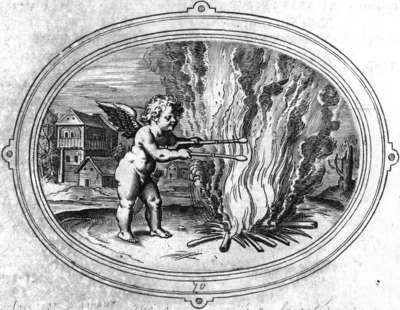Quis enim securus amavit? [70]

Translations
 |
Ovidius, Heroides 19, 109.
Beminnen gaat nooit zonder zorgen. |
 |
Ovidius, Heroides 19, 109.
For who that loved was ever free from care? [tr. G. Showerman, Loeb, p. 267.]. |
 |
[Plutarchus] Zoals vuur niet onderdrukt kan worden of tot rust gebracht, zo is de geest van een minnaar altijd beweeglijk
en onrustig. |
 |
[Plutarchus] Like a fire that can not be suppressed nor rest, the mind of a lover is always swift and restless. |
Literature
- Sebastiàn, Lectura crítica
 , p. 35
, p. 35
Sources and parallels
- The god Pan trying to embrace the flames: Quod non noris, non ames. [5] (in: Jacob Cats, Sinne- en minnebeelden (1627))
[Compare
![Compare [compare]](/static/images/compare2.gif) ]
]
-
Parallel for the pictura (mirrored, less detailed) and for some mottoes (Latin, Italian) in: Un Amour voulant prendre la Flamme avec une Pincette (in: Daniel de la Feuille, Devises et emblemes (1691))
[Compare
![Compare [compare]](/static/images/compare2.gif) ]
]
-
Burning stove also in: De verlichte Ziele verklaert het uyterlijcke vernuft; het afscheyden eens rechtveerdigen [21] (in: Jan Luyken, Jesus en de ziel (1685))
[Compare
![Compare [compare]](/static/images/compare2.gif) ]
]
-
Parallel for the pictura (burning stove) in: Derde Verdeeling. [3] (in: Jan Luyken, Duytse lier (1671))
[Compare
![Compare [compare]](/static/images/compare2.gif) ]
]
-
Source for: Quis enim securus amavit? [40] (in: Otto Vaenius, Emblemata aliquot selectiora amatoria (1618))
[Compare
![Compare [compare]](/static/images/compare2.gif) ]
]
References, across this site, to this page:
- Quod non noris, non ames. [5] (in: Jacob Cats, Sinne- en minnebeelden (1627))
- Un Amour voulant prendre la Flamme avec une Pincette (in: Daniel de la Feuille, Devises et emblemes (1691))
- Derde Verdeeling. [3] (in: Jan Luyken, Duytse lier (1671))
- De verlichte Ziele verklaert het uyterlijcke vernuft; het afscheyden eens rechtveerdigen [21] (in: Jan Luyken, Jesus en de ziel (1685))
- De verlichte Ziele verklaert het uyterlijcke vernuft; het afscheyden eens rechtveerdigen [21] (in: Jan Luyken, Jesus en de ziel (1685))
- Quis enim securus amavit? [40] (in: Otto Vaenius, Emblemata aliquot selectiora amatoria (1618))
Iconclass
In vain Cupid tries to catch the flames of a fire with a pair of fire-tongs- farm or solitary house in landscape
[25I3]

- camp-fire; watch-fire
[41B16]

- fire-tongs
[41B2121]

- Unrest, Restlessness, Inquietude; 'Inquietudine' (Ripa) (+ emblematical representation of concept)
[54AA46(+4)]

- (personifications and symbolic representations of) Love; 'Amore (secondo Seneca)' (Ripa) (+ emblematical representation of
concept)
[56F2(+4)]

- proverbs, sayings, etc. (with TEXT)
[86(QUIS ENIM SECURUS AMAVIT?)]

- other non-aggressive activities of Cupid
[92D156]

![[H O M E : Emblem Project Utrecht]](/static/images/rd-small.gif)


















































































































































